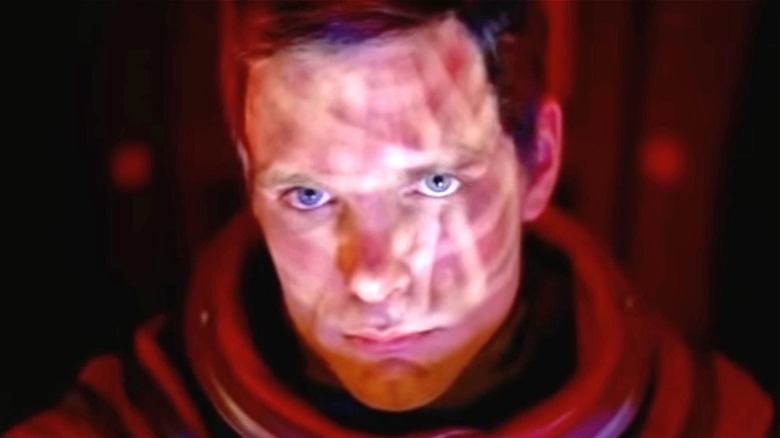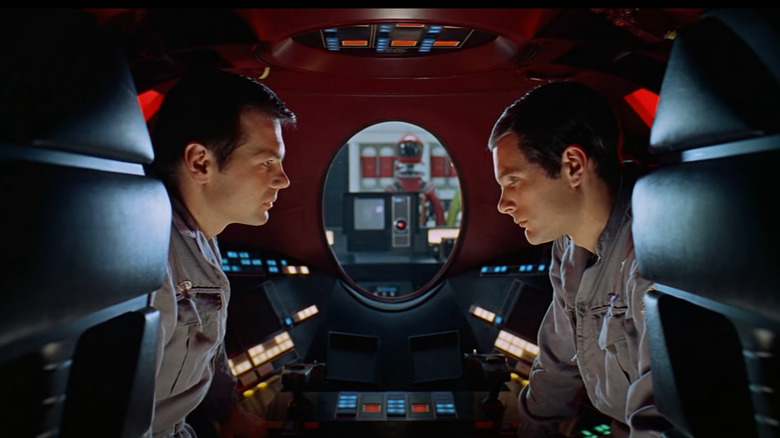The Real Reason HAL From 2001: A Space Odyssey Was Recast
Humanity's troubled relationship with the double-edged sword of technology has featured in mythology and fiction for centuries, from Prometheus' punishment for stealing fire from heaven through Mary Shelley's "Frankenstein" (subtitled "The Modern Prometheus") to E.T.A. Hoffmann's "The Sandman," in which a young man falls in love with an automaton and goes insane as a result. In the 20th and 21st centuries, cinema and TV have explored the angst we feel at the growing power and prevalence of computers and artificial intelligence (AI) in our lives.
The granddaddy of cinematic AI gone bad is HAL 9000 in Stanley Kubrick's 1968 film "2001:A Space Odyssey," which weaves a grand narrative of human evolution, man's exploration of space, and extraterrestrial life vastly superior to homo sapiens intervening at key points in our species' development. Integral to this space odyssey is a manned mission to Jupiter during which the ship's computer HAL, who apparently malfunctions (though this is ambiguous), decides to execute the entire human crew.
HAL proves to be a strangely compelling character: faceless except for a single red "eye;" even-toned and almost monotonous in speech; a benign, though possibly patronizing genius far beyond the intelligence level of his human wards. Hal plays chess with crewmate Frank Poole (Gary Lockwood), and generously comments on crewmate Dave Bowman's (Keir Dullea) sketched portraits of his fellow crewmembers in hypersleep. When HAL does go bad, he embodies everything we fear about all-powerful, soulless, heartless, calculating technology turned against we soft, squidgy, flawed humanoids.
How did Kubrick manage to characterize HAL so strongly through voice alone? Of course, it all came down to the actor's performance. And, as was often the case with Kubrick, he wasn't satisfied with the first go-around.
Kubrick changed his mind about HAL's vocal characterization
How exactly did Kubrick achieve the unmistakable Hal 9000 sound, that unsettling tone of banality and ambivalence with just the slightest possibility of humanity beneath? According to The New York Times, Kubrick initially didn't want Hal to sound even remotely machine-like. His initial vision was that of a regular human voice. His first choice for Hal was renowned Hollywood character actor Martin Balsam, who had previously starred in "12 Angry Men," "Psycho," "Breakfast at Tiffany's," and "Cape Fear," and would later play in "Little Big Man," "Catch-22," "Tora! Tora! Torah!," "The Taking of Pelham 123," "All the President's Men," and Scorsese's remake of "Cape Fear." Balsam recorded all of HAL's lines to Kubrick's specifications, but the director wasn't happy with the results, feeling that Balsam made Hal sound "a little bit too colloquially American."
So Kubrick tasked his staff with finding a replacement actor for HAL, looking for a voice that was "neither patronizing, nor is it intimidating, nor is it pompous, overly dramatic or actorish." Kubrick's final choice for HAL's voice was Canadian Douglas Rain, who had narrated the documentary "Universe," of which Kubrick was a fan. Kubrick had originally planned to include voiceover narration in "2001: A Space Odyssey," and Rain had been in contention for the narrator role. Kubrick felt Rain's "bland mid-Atlantic accent" and steady, placid delivery were perfect for HAL.
And so, thanks to his legendary perfectionism, Kubrick arrived at the unforgettable character of HAL 9000 – an uncanny, unnerving machine presence who expresses fatherly benevolence and clinically calculated homicide with the same soothing tone.

